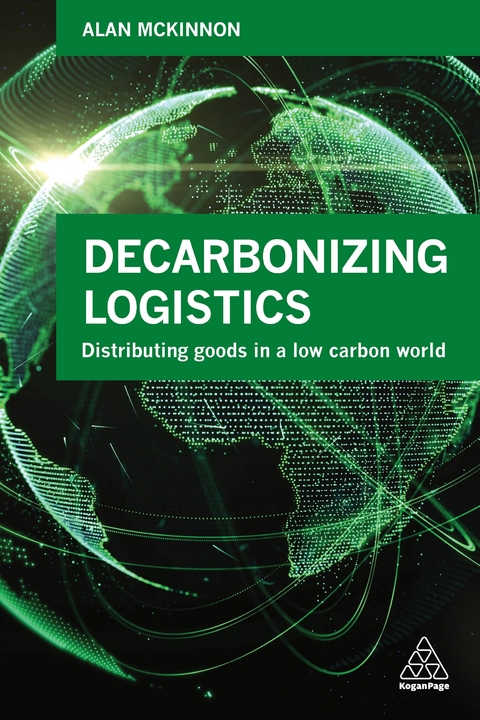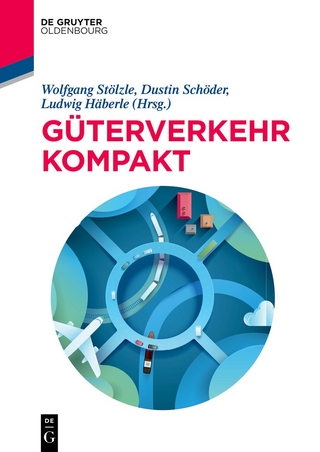
Decarbonizing Logistics
Kogan Page Ltd (Verlag)
978-0-7494-8047-9 (ISBN)
Logistics accounts for around 9-10% of global CO2 emissions and will be one of the hardest economic sectors to decarbonize. This is partly because the demand for freight transport is expected to rise sharply over the next few decades, but also because it relies very heavily on fossil fuel. Decarbonizing Logistics outlines the nature and extent of the challenge we face in trying to achieve deep reductions in greenhouse gas emissions from logistical activities. It makes a detailed assessment of the available options, including restructuring supply chains, shifting freight to lower carbon transport modes and transforming energy use in the logistics sector. The options are examined from technological and managerial standpoints for all the main freight transport modes.
Based on an up-to-date review of almost 600 publications and containing new analytical frameworks and research results, Decarbonizing Logistics is the first to provide a global, multi-disciplinary perspective on the subject. It is written by one of the foremost specialists in the field who has spent many years researching the links between logistics and climate change and been an adviser to governments, international organizations and companies on the topic.
Alan McKinnon is Professor of Logistics at Kühne Logistics University, Hamburg. He has been researching and teaching freight transport and logistics for almost forty years and has published extensively in journals and books. He was a member of the European Commission's High Level Group on Logistics, Chairman of the World Economic Forum's Logistics and Supply Chain Industry Council and a lead author of the transport chapter of the Intergovernmental Panel on Climate Change's fifth assessment report. He has spent many years researching the links between logistics and climate change and been an adviser to governments, international organizations and companies on this topic.
Chapter - 01: Climate change: the nature and scale of the challenge;
Chapter - 02: Developing a decarbonisation strategy for logistics;
Chapter - 03: Reducing freight transport intensity;
Chapter - 04: Shifting freight to lower carbon transport modes;
Chapter - 05: Improving asset utilisation in logistics;
Chapter - 06: Transforming energy use in road freight transport;
Chapter - 07: Transforming energy use in maritime, air cargo and rail freight sectors;
Chapter - 08: Decarbonising logistics at the national level: the case of the united kingdom;
"Professor McKinnon is making again a ground-breaking contribution. The greenhouse gas footprint of logistics is large. Reducing it relies on several mechanisms, because logistics involves many activities and participants. This book disentangles this complexity and proposes a clear framework for reduction. It identifies interventions by shippers, service providers or the public sector. The book lays the foundations of initiatives to come. It should appeal to a wide range of policymakers, academics and practitioners."
"The UK's rising transport emissions are an indicator of the importance and timeliness of this book. The clear analytical approach, using the latest models - whilst avoiding complex language and mathematics - provides practical, evidence-based advice for a wide range of users, including logistics companies, regulators, politicians, policy makers and researchers."
"Continued advances in logistics have enabled ever more globalized production of goods and services, bringing higher incomes, new jobs and more consumer choice in developed and developing countries alike. This progress has come at a price: the CO2 emissions associated with moving the raw materials, inputs and consumer goods are causing climate change with detrimental effects for the same populations that benefit from the growing trade. Alan McKinnon's book could not come at a more timely moment. We need to decarbonize logistics if we want to ensure that in the long term its negative impacts don't outweigh its contribution to global wellbeing. The book's analysis, combined with concrete policy recommendations to reduce the carbon intensity of logistics, provide invaluable tools for national policy makers and the international community."
"This book is a long-overdue and comprehensive analysis that goes far beyond explaining why we need to decarbonise logistics - a sector that is expected to triple in volume by 2050. It synthesises a huge and highly diverse literature and shows that there is no shortage of strategies and carbon-reducing initiatives. Policy-makers and business leaders, committed to bringing emissions down to levels consistent with the COP21 Paris Climate Change Agreement will find a wealth of technical information and practical examples to help then update regulation and design programs and action plans."
"Decarbonizing Logistics will become the reference for all logistics professionals."
| Erscheinungsdatum | 29.05.2018 |
|---|---|
| Verlagsort | London |
| Sprache | englisch |
| Maße | 160 x 240 mm |
| Gewicht | 640 g |
| Themenwelt | Technik ► Fahrzeugbau / Schiffbau |
| Technik ► Luft- / Raumfahrttechnik | |
| Technik ► Umwelttechnik / Biotechnologie | |
| Wirtschaft ► Betriebswirtschaft / Management ► Logistik / Produktion | |
| Wirtschaft ► Betriebswirtschaft / Management ► Unternehmensführung / Management | |
| Wirtschaft ► Volkswirtschaftslehre | |
| ISBN-10 | 0-7494-8047-5 / 0749480475 |
| ISBN-13 | 978-0-7494-8047-9 / 9780749480479 |
| Zustand | Neuware |
| Haben Sie eine Frage zum Produkt? |
aus dem Bereich


